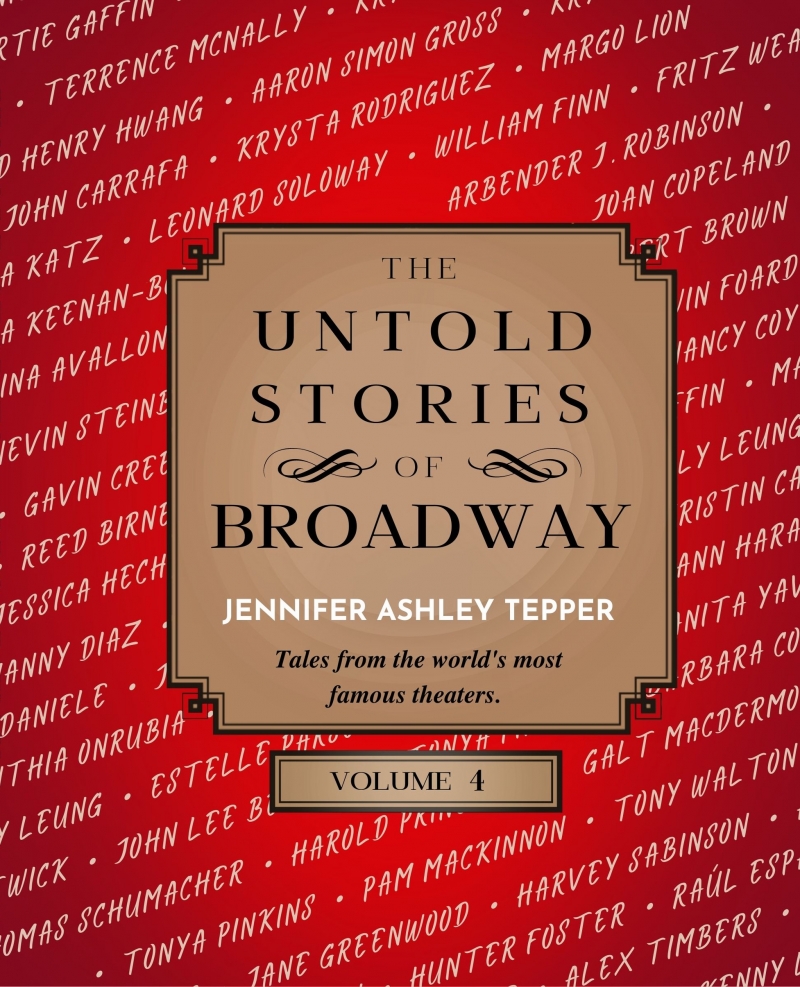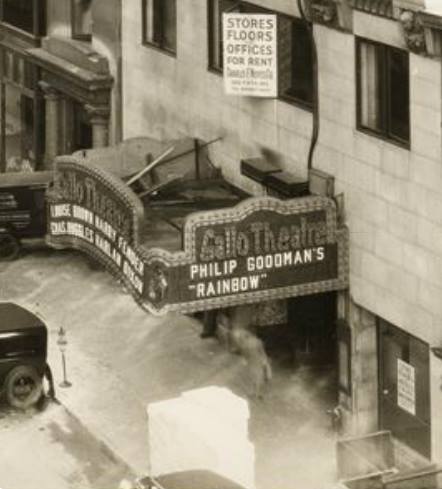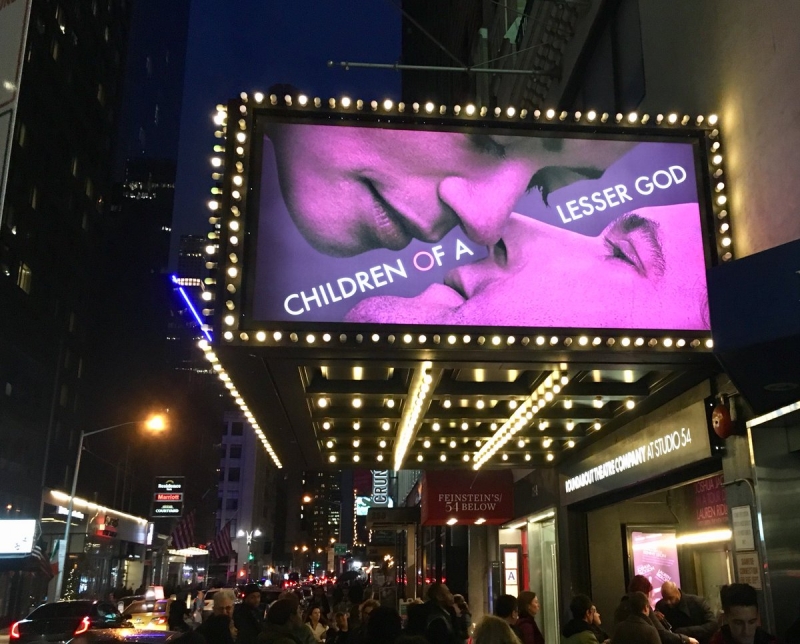BWW Exclusive: Jennifer Ashley Tepper's THE UNTOLD STORIES OF BROADWAY, VOLUME 4- Spotlight on Studio 54
Did You Know: Studio 54 did not have a Broadway hit for 71 years?
 On Tuesday, March 9, Dress Circle Publishing will release of THE UNTOLD STORIES OF BROADWAY, VOLUME 4, the latest in a series by acclaimed historian and producer Jennifer Ashley Tepper. This landmark multi-volume series tells the stories of all of the theaters on Broadway; the new addition includes the beloved houses the Imperial, Jacobs, Studio 54, Minskoff, Friedman, and Golden, as well as the five Broadway theaters that were destroyed in 1982, changing the course of New York City history.
On Tuesday, March 9, Dress Circle Publishing will release of THE UNTOLD STORIES OF BROADWAY, VOLUME 4, the latest in a series by acclaimed historian and producer Jennifer Ashley Tepper. This landmark multi-volume series tells the stories of all of the theaters on Broadway; the new addition includes the beloved houses the Imperial, Jacobs, Studio 54, Minskoff, Friedman, and Golden, as well as the five Broadway theaters that were destroyed in 1982, changing the course of New York City history.
These invaluable books illuminate Broadway through the eyes of the producers, actors, stage hands, writers, musicians, company managers, dressers, designers, directors, ushers, door people and more who bring the theater to life each night.
Can't wait to get your hands on it? Let BroadwayWorld hold you over with a special sneak peek from a chapter all about Studio 54:
Studio 54
Did You Know:
One tradition during the Sunday in the Park with George revival got a little too rowdy?
2008: A Game Called White
Brynn O'Malley, Actor
We used to play a game we called White. On the monitor, what you'd hear from backstage was a pre-show announcement and then applause and then silence. Daniel Evans, who played George, would enter on a blank stage, and eventually say, "White." It was up to him when he wanted to say the word and start the show. I don't know how it started, but we began trying to say "white" at the exact moment Daniel did. So, if you were standing around backstage for any reason, you'd hear a bunch of people saying some version of: "White!... aww man."
There was a game tally in my dressing room. We used The Price Is Right rules: whoever got the closest to saying it with him without saying it after him was the winner. Every night, almost every cast member would play. We'd all gather in the female ensemble dressing room, even the kids. It got out of control and heated. One night, someone got it exactly and everyone started screaming. Onstage, right after Daniel said, "white," he heard a bunch of people screaming faintly in the background. That night, Daniel and Jenna were like, "What is happening down there?!" We decided to make that the last day we played, because it got too loud.
Did You Know:
Studio 54 did not have a Broadway hit for 71 years?
 When the average person hears "Studio 54," they think of the infamous nightclub of the 1970s. But Studio 54 actually opened as a Broadway theater called Gallo Opera House in 1927. Today, it still stands as a Broadway theater, 93 years later. But until Roundabout Theatre Company took over the house, it spent less than 10 years total as a legitimate theater. Only from 1927 to 1933 and 1936 to 1940 could audiences see shows at Broadway's lone house on 54th Street.
When the average person hears "Studio 54," they think of the infamous nightclub of the 1970s. But Studio 54 actually opened as a Broadway theater called Gallo Opera House in 1927. Today, it still stands as a Broadway theater, 93 years later. But until Roundabout Theatre Company took over the house, it spent less than 10 years total as a legitimate theater. Only from 1927 to 1933 and 1936 to 1940 could audiences see shows at Broadway's lone house on 54th Street.
That fact alone makes Studio 54 stand out among our Broadway theaters. Even houses that spent some time abandoned or repurposed as television studios have at least a few decades of Broadway history otherwise! But nearly all of these were built long enough before the Great Depression to get their footing before the stock market crashed and audiences dried up. Gallo Opera House was one of the last theaters built during the Times Square theater boom that started around 1903 and gave us nearly all of our current houses. It had seven flops in a row-and then the stock market crashed. A new owner took over and had ten flops in a row. Then the theater was a nightclub, a home for the Federal Theatre Project, and a legit house for two more quick flops before closing in 1940 and never again presenting theater until Roundabout's Cabaret moved in in 1998.
How was it possible that a theater that waited 71 years for its first hit survived?
That's the story of Studio 54.
In 1940, the final legit production at the house for 58 years was Medicine Show.
Medicine Show was an attempt by commercial producers to do what had been attempted at the Biltmore and elsewhere by the Works Progress Administration with the Living Newspaper Project. This play with music was a true chronicle of public health and medical practices. The American Medical Association was the villain in this dramatic presentation fighting for both doctors' and patients' rights. Most critics told readers that the information the play presented made it essential viewing. Medicine Show dramatized the fact that 250,000 Americans died every year from lack of access to medical care, and that the country needed a better plan for universal health care.
Two of the stars of Medicine Show were Leigh Whipper, the first Black member of Actors' Equity Association, and Martin Gabel, who also produced and had a long career on Broadway.
By many people's estimation, Medicine Show should've been a hit. It made a powerful statement. It was talked about all over town. The reviews were good. But it unceremoniously closed after 35 performances.
This theater was absolutely, hopelessly cursed, New Yorkers remarked as they walked by the structure on 54th Street. The theater was abandoned from May 1940 until January 1941 when CBS began conducting some presentations in the theater. They installed a 15 x 20 television onstage and showed an audience a boxing match at Madison Square Garden to illustrate the quality of a large television screen. It was the first time that television was publicly screened in a New York theater in this way.
Did You Know:
Kenny Leon made several unexpected discoveries while directing Children of a Lesser God at Studio 54?

2018: Listening To Each Other
Kenny Leon, Director
We did an out-of-town tryout for Children of a Lesser God in the Berkshires, and then tried to get a Broadway house. We saw a few theaters that might be available and then we were offered Studio 54. Rather than holding out for a more intimate house, we decided to take it. I spent a day at Studio 54 and realized I could make the show into what it needed to be there.
Sometimes you get lucky and know which theater you're planning your show around. But these days, with the number of long-running Broadway shows and the level of demand on the remaining houses, it's hard. Many times, you have no idea which space you'll be in until very close to the production starting. But in this case, we knew in summer 2017 that we'd have Studio 54 in spring 2018, so the set designer, Derek McLane, and I could start planning around it. We began relatively early playing with ideas and seeing how we could transfer and enhance what we had in the Berkshires to this new venue. I was able to bring the sound designer to the new space early, too. It made a difference.
What first attracted me to Children of a Lesser God is not what I ended up loving about it. When I was initially approached about directing the play, I thought it was just a love story between a Deaf woman and a hearing sign language teacher. When I was preparing to direct Children of a Lesser God, I wanted to learn a bit of sign language, so I was referred to a teacher. I took lessons with this sign language teacher for about a year before realizing that this woman could actually play the lead role in our production. What was interesting was that she was a Black woman and I had never thought the woman was going to be Black.
We were planning a workshop of Children of a Lesser God and I convinced the producers to let me use my sign language teacher, Lauren Ridloff, in the lead role. She was playing opposite Joshua Jackson, who I had worked with off-Broadway on Smart People and who I knew was interested in working on Broadway together. They hit a home run together and that was that. I was thrilled that my instincts about Lauren were correct. She wasn't an actress before our production, but she is now. In addition to being Deaf, she has two Deaf children, and a husband who is Deaf, so she instructed me on how to properly cast the play.
Because Lauren is Black, I figured the off stage character of her father would be white and her mother would be Black. I made the lawyer in the play Korean American and the head of the school white, so the cast of the play looked like America. Now, to me, the play is about how we all pretend we're God and try to make each other over and pass that off as communication. The play is about how we don't listen to each other now. And whether you're Black, white, Democrat, Republican, strangers, or spouses, we have to really listen to each other when we talk. We have to stop trying to make each other over, and just respect each other for who we are. Children of a Lesser God is about the climate in America now, wrapped around this beautiful love story between this woman and this man, one Deaf and one not.
To pre-order THE UNTOLD STORIES OF BROADWAY, visit www.dresscirclepublishing.com.
 Jennifer Ashley Tepper is producer of the musicals Be More Chill, Broadway Bounty Hunter, and Love in Hate Nation, recent projects that are part of a decade-long collaboration with the group known as Joe Iconis & Family. From producing small concerts in basements to producing a show on Broadway, Tepper has cultivated the theatrical collective which The New York Times called "the future of musical theatre." She is also the Creative and Programming Director at Feinstein's/54 Below, where she has curated or produced over 3,000 shows, including musicals in concert, original solo acts, theatrical reunions, songwriter celebrations, and more. Tepper's leadership at the venue has gained praise from publications including The New York Times, Huffington Post, Buzzfeed, Playbill, Newsday, New York Post, and more.
Jennifer Ashley Tepper is producer of the musicals Be More Chill, Broadway Bounty Hunter, and Love in Hate Nation, recent projects that are part of a decade-long collaboration with the group known as Joe Iconis & Family. From producing small concerts in basements to producing a show on Broadway, Tepper has cultivated the theatrical collective which The New York Times called "the future of musical theatre." She is also the Creative and Programming Director at Feinstein's/54 Below, where she has curated or produced over 3,000 shows, including musicals in concert, original solo acts, theatrical reunions, songwriter celebrations, and more. Tepper's leadership at the venue has gained praise from publications including The New York Times, Huffington Post, Buzzfeed, Playbill, Newsday, New York Post, and more.
On Broadway, Tepper has worked on [title of show], The Performers, Godspell, Macbeth, and The Parisian Woman, and off-Broadway Smokey Joe's Café and Boys' Life. Tepper is the conceiver and director of The Jonathan Larson Project which premiered in fall 2018 and received an original cast recording from Ghostlight Records. She is historian consultant on the upcoming tick, tick... BOOM! movie and co-creator of the Bistro Award-winning concert series, "If It Only Even Runs A Minute," now in its 11th year. Tepper recently received a 2020 Lincoln Center Emerging Artist Award. She was named one of the 10 professionals on Backstage's first annual "Broadway Future Power List," which stated: "Proving herself both a zeitgeist predictor and theatrical historian with her eclectic programming, Tepper is leading the conversation on contemporary musical theatre."
Comments

Videos


